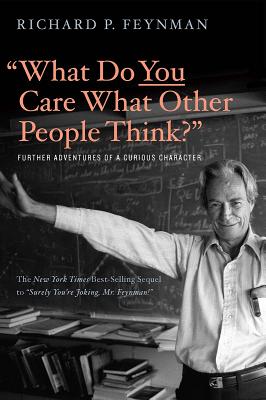
What Do You Care What Other People Think?: Further Adventures of a Curious Character
(Depends on publisher)
The New York Times best-selling sequel to "Surely You're Joking, Mr. Feynman!"
| Quantity | Price | Discount |
|---|---|---|
| List Price | $15.95 | |
| 1 - 24 | $13.56 | 15% |
| 25 - 99 | $11.17 | 30% |
| 100 - 499 | $10.37 | 35% |
| 500 + | $10.05 | 37% |
$15.95
Book Information
| Publisher: | W. W. Norton & Company |
|---|---|
| Publish Date: | 02/06/2018 |
| Pages: | 288 |
| ISBN-13: | 9780393355642 |
| ISBN-10: | 0393355640 |
| Language: | English |
Full Description
Like the "funny, brilliant, bawdy" (The New Yorker) "Surely You're Joking, Mr. Feynman!" this book's many stories--some funny, others intensely moving--display Richard P. Feynman's unquenchable thirst for adventure and unparalleled ability to recount important moments from his life.
Here we meet Feynman's first wife, Arlene, who taught him of love's irreducible mystery as she lay dying in a hospital bed while he worked on the atomic bomb at nearby Los Alamos. We listen to the fascinating narrative of the investigation into the space shuttle Challenger's explosion in 1986 and relive the moment when Feynman revealed the disaster's cause through an elegant experiment: dropping a ring of rubber into a glass of cold water and pulling it out, misshapen. In "What Do You Care What Other People Think?" one of the greatest physicists of the twentieth century lets us see the man behind the genius.

